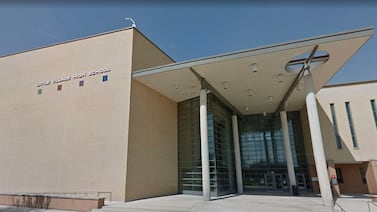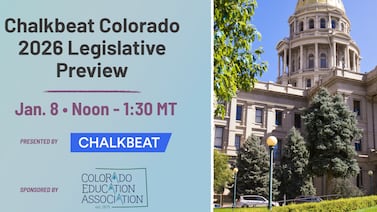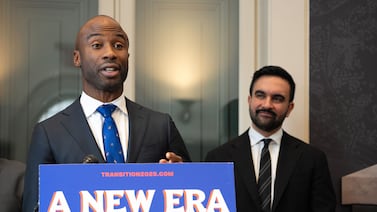Sign up for Chalkbeat Indiana’s free daily newsletter to keep up with Indianapolis Public Schools, Marion County’s township districts, and statewide education news.
In a Ball State classroom on a recent Tuesday, Professor Sheron Fraser-Burgess told her class to brace themselves for the “really controversial” argument from their reading:
“There’s no such thing as reverse ‘-ism.’ Women can be just as prejudiced as men, but can’t be as sexist, because they don’t have the power.”
Then she invited the class to weigh in.
Her students were quick to disagree with that argument and with each other, as well as Fraser-Burgess, who leaned back against a desk and listened.
She said it’s critical to her that her students — potential future teachers — learn about prejudice, discrimination, racism, sexism, and other “isms,” before they step into their own classrooms and assume power over others. That power can turn personal prejudice into an “ism” they perpetuate, she told them.
But some fear a new Indiana law that drastically alters universities’ diversity policies could have a chilling effect on teacher prep classes like Fraser-Burgess’ multicultural education course. The result could be that preservice teachers are less prepared to use best practices, challenge their own assumptions, and work with students who come from a variety of backgrounds through practices like culturally responsive teaching, these critics say.
That’s not the intent of the new law, said Sen. Spencer Deery, a Republican and the architect of the statute, which compels universities to stress “intellectual diversity” alongside cultural diversity. It requires professors to present a variety of viewpoints in their curriculum, and imposes consequences for not doing so, including demotion and denial of tenure.
It also creates a complaint procedure for students and staff to report faculty who bring unrelated politics into the classroom to their universities. To a certain extent, that aspect of the law resembles a public web portal set up by state Attorney General Todd Rokita for parents to submit complaints about how schools address race, gender, and political ideology.
Pushing back on concerns that the law could shrink the pool of future educators, Deery said it could instead encourage students who currently don’t feel welcome on college campuses — namely, conservative students — to enroll.
“If we don’t recognize that some Hoosiers are not going into higher ed because they don’t feel like someone from their background is going to be respected, or they’re going to be exposed only to views of some paradigms, that’s a problem,” Deery said.
What does the new ‘intellectual diversity’ law do?
Universities are currently in the process of implementing the law known as SEA 202, which Gov. Eric Holcomb signed into law in March.
During this year’s legislative session, lawmakers heard hours of testimony in opposition to SEA 202 from faculty and students who said it represented an overreach into university classrooms, and could force professors to teach flawed information.
They drew comparisons to similar laws on the books in Florida targeting diversity, equity, and inclusion programs, and said it could lead to brain drain in the state as faculty leave or decline jobs in Indiana, accept positions elsewhere, and take their grant funding with them.
This could have an outsize effect on faculty of color, who are often tasked with leading diversity initiatives, and already face more complaints from students about what and how they teach, said Russ Skiba, an IU professor who has led opposition to 202.
In teacher training programs, this could create a snowball effect on preservice teachers and their future students, said Alexander Cuenca, an IU professor who has written about the barriers facing teacher candidates of color.
“If students can’t see themselves in the classroom, if we’re scared to mention Black perspectives in social studies, why would they go into teaching social studies?” he said.
But Deery, who spent a decade working at Purdue University, said he wrote the bill after seeing data that conservatives were losing trust in higher education.
A 2023 survey of free speech on Indiana campuses by the state Commission on Higher Education found that 72% of students believed that politically liberal students were free to express their views on campus, compared to 55% who said conservative students could do the same. Overall, 78% of survey respondents said that generally, students are free to express their opinions at their universities.
Deery has also cited data showing that conservative students feel less welcome on campuses than other students think they might feel. This data was part of the free speech survey, but has not been released publicly, Deery said. The commission was not able to make this data available to Chalkbeat by deadline.
Deery said 202 doesn’t prescribe or prohibit specific curriculum, but instead requires that professors present the full spectrum of viewpoints that exist within their discipline.
It’s up to university boards and departments to decide how to implement that — and that could mean some curriculum is cut while curriculum from underrepresented viewpoints is added, he said. When it comes to teaching diversity, Deery said he believes that should include cultural, racial, and ideological diversity.
“It’s not about making students feel comfortable, but feel respected,” he said. “College should make you uncomfortable. But that doesn’t give you license to ignore some perspectives.”
How the law affects teacher preparation
As the discussion of sexism went on in Fraser-Burgess’ class, one student pointed out the growing number of female band directors as a sign of more equality in the industry. Another countered that someone should ask those directors about the sexism they’ve experienced in their careers.
One recalled that a male kindergarten teacher faced distrust from parents as an example of how sexism can affect men.
The discussion zeroed in on the pressure boys and young men face to be stoic and successful. It continued until the final moments of the class.
Fraser-Burgess said she aims to cultivate an environment where students feel heard and know they won’t face retaliation for disagreeing with her.
The objective of her course is to help preservice teachers understand how bias can emerge in education, and how students’ backgrounds may affect their school experience.
What concerns her most about the new law is the reporting mechanism that would allow students who feel uncomfortable confronting these topics to complain about her class to the university.
Under the law, universities would need to establish a procedure allowing students and staff to complain about faculty who have not fostered free inquiry and intellectual diversity, who don’t expose students to a variety of political and ideological frameworks, or who bring politics unrelated to their discipline into the classroom. These complaints would be referred to supervisors and human resources departments for consideration in tenure promotion decisions.
“I’m an African American teacher telling them they need to disavow racism to be a public school teacher. It can come across with much more intensity, it may seem I’m being political or ideological,” she said.
If these complaints chill classroom discussion, it would mean future teachers have less exposure to teaching practices that are good for all students, she said.
“If we’re not fostering an ability to live with others and appreciate how they contribute to our society, to question our own experience as right or the default, we’re weakening our democracy, which is based on difference,” she said.
Deery said colleges already have a number of ways for students to report complaints about professors, and that the reporting mechanism of 202 only standardizes the process. Deery also said he trusts schools to filter out bogus complaints.
But some say the threat of complaints is enough to chill speech. And preservice teachers are learning as much from observing their professors as they are from the course content, said Cuenca, the IU professor.
“They’re in front of me, watching me teach,” Cuenca said. “If it influences the way I am able to speak, it’s going to impact how they’re going to be able to do it.”
What culturally responsive teaching looks like in practice
In recent years, teachers in Indiana and nationwide have reported a hesitancy to approach topics about race and diversity in class amid attempts to ban such lessons.
But teachers say learning culturally responsive teaching — or connecting students’ backgrounds and experiences to the classroom — is still an important tool.
For one, it helps educators build relationships with students and their families, said Cynthia Diaz, a teacher at Enlace Academy, an Indianapolis charter school where more than 80% of families speak a language other than English at home.
For example, when her students read “When Stars are Scattered,” the story of Somali refugees resonated with many of them, Diaz said. But the book also offered an opportunity to invite families to discuss the book and their own stories of immigrating to the U.S., both with their students at home and at a school event.
Having an awareness of their students’ cultures, backgrounds, and experiences also allows teachers to pause and challenge their own understanding, Diaz said.
“It’s the ability to be reflective. When you’re in a silo, you think ‘this is what I was taught, what school was like for me, so this is what school should be like.’” Diaz said. “In my opinion, it should be about what school should look like for the students in front of you.”
Aleksandra Appleton covers Indiana education policy and writes about K-12 schools across the state. Contact her at aappleton@chalkbeat.org.





